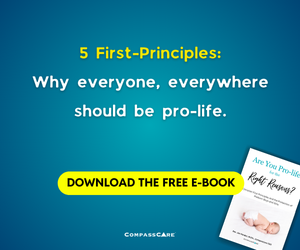A Texas judge has ruled a baby can be killed in an abortion just because the baby is disabled.
Katie Cox is suing Texas , saying she is seeking an emergency exception in the state’s law protecting babies from abortions for a pregnancy that is destined to end in the death of the baby.
The lawsuit claims the baby has Trisomy 18, which is not proven because prenatal tests often fail.
“It is not a matter of if I will have to say goodbye, but when,” she said in the lawsuit. “I do not want to continue the pain and suffering that has plagued this pregnancy.”
Cox’s baby is approximately 20 weeks old.
And today, a judge ruled she can legally get an abortion despite the fact that Texas law only allows abortions to save the life of the mother. Cox lawsuit claims that not having an abortion could make it so she can’t get pregnant again, even though the abortion could cause the same problem.
In an emergency hearing Thursday, a judge granted a temporary restraining order against the state that would allow Cox to immediately have an abortion.
“The idea that Mrs. Cox wants desperately to be a parent, and this law might actually cause her to lose that ability is shocking and would be a genuine miscarriage of justice,” Judge Maya Guerra Gamble said. “So I will be signing the order and it will be processed and sent out today.”
REACH PRO-LIFE PEOPLE WORLDWIDE! Advertise with LifeNews to reach hundreds of thousands of pro-life readers every week. Contact us today.
The ruling ignores the fact that abortion is linked to infertility and women have been unable to have children because of previous abortions.
A texas pro-life group talked about the case and said abortion is unnecessary.
“It is heartbreaking to hear of any family facing a tragic diagnosis for their unborn child,” said Amy O’Donnell, Texas Alliance for Life’s Communications Director. “At the same time, Texas Alliance for Life does not support taking the life of an unborn child because of a life-limiting or fatal diagnosis.”
“The Center for Reproductive Rights’ goal is for the courts to chisel away at the protections for unborn babies under the guise of ‘clarifying’ the law until elective abortion is legal up to birth,” added O’Donnell. “We believe that the exception language in Texas laws is clear. Doctors can exercise reasonable medical judgment to provide abortions in those rare cases involving risk to the mother’s life. Whether a particular case qualifies for that exception is an objective medical determination the physicians involved can make.”
Deirdre Cooper, a public policy analyst for Texas Alliance for Life, gave a statement about her son Bosco, who died before birth from Trisomy 18.
“Carrying Bosco in my womb was the greatest honor of my life,” she said. “For four months, I had the privilege of sharing his story with anyone who asked about my pregnancy. Each day, I woke up thanking God that Bosco was still alive. We had been granted one more day with him — what a blessing! It also allowed us to plan his funeral and prepare our children for his impending death.”
Texas attorneys argued that Cox’s pregnancy presented no threat to her life or health and that the judge can’t unilaterally change state law. Currently Texas only allows abortions in rare cases to save the mother’s life, which is defined in the law as “a life-threatening physical condition aggravated by, caused by, or arising from a pregnancy that, as certified by a physician, places the woman in danger of death or a serious risk of substantial impairment of a major bodily function unless an abortion is performed.”
“It is heartbreaking to hear of any family facing a tragic diagnosis for their unborn child,” said Amy O’Donnell, Texas Alliance for Life’s Communications Director. “At the same time, Texas Alliance for Life does not support taking the life of an unborn child because of a life-limiting or fatal diagnosis.”
Not only does this show heartbreaking discrimination against people with disabilities, studies show prenatal testing is often wrong and healthy babies are being killed in abortions after false positives.
However, there’s significant question about whether the baby has Trisomy 18 in the first place.
Early prenatal tests for rare disorders often lead to thoughts about abortion for expecting parents. Sometimes, doctors and genetic counselors pressure parents to abort their unborn babies after a positive test, and both healthy and unhealthy unborn babies are killed in abortions as a result.
Earleir this year, a new analysis by the New York Times has found that some of the most common prenatal screening tests are not as reliable as parents often are led to believe and many healthy unborn babies may be being aborted as a result of false positives.
Examining five non-invasive prenatal tests, which involve drawing blood in the first trimester, the Times found an average false positive rate of 85 percent.
To conduct its research, the newspaper examined multiple studies and interviewed researchers about five of the most common microdeletion (chromosomal disorder) tests performed on pregnant mothers: tests for DiGeorge syndrome, 1p36 deletion, Cri-du-chat syndrome, Wolf-Hirschhorn syndrome, Prader-Willi and Angelman syndromes.
Those false positives could include Cox’s baby.
According to the report, experts said early prenatal tests for Patau syndrome (trisomy 13) and Turner syndrome (monosomy X) also have a lot of false positives, but tests for Down syndrome and Edwards syndrome are more reliable.
One of the problems with the high inaccuracy rates in the tests is that “there are hundreds of microdeletion syndromes, and the most expansive tests look for between five and seven,” according to the Times. This means that not only are the false positives a problem, but the results also are not proof that the baby does not have the disorder.
Despite the lack of certainty, the tests are marketed as “reliable” and “accurate,” the report found. The test companies do recommend follow-up testing to confirm the results, but parents do not always do this. More accurate tests come with a risk of miscarriage and can be expensive, so some parents go on the early, unreliable results alone to make a decision about their unborn baby’s life.
One geneticist told the Times about a recent case where an early prenatal test came back positive for a rare disorder, so the parents aborted their unborn baby. Later, however, a follow-up test after the abortion showed that the unborn baby had been healthy, the geneticist said.
The report continues: “A 2014 study found that 6 percent of patients who screened positive obtained an abortion without getting another test to confirm the result. That same year The Boston Globe quoted a doctor describing three terminations following unconfirmed positive results.”
The expanded use of prenatal testing has led to more unborn babies with disabilities being targeted for abortions. Recent reports in The Atlantic and CBS News found that nearly 100 percent of unborn babies who test positive for Down syndrome are aborted in Iceland, 95 percent in Denmark, 77 percent in France and 67 percent in the United States.
The deadly discrimination is getting worse with the expanded use of prenatal testing. The Telegraph reports a recent article in the European Journal of Human Genetics found that the number of babies with Down syndrome born in the United Kingdom dropped 54 percent since the non-invasive prenatal screening tests became available about a decade ago.
What’s more, parents frequently report feeling pressured to abort unborn babies with disabilities. One mom recently told the BBC that she was pressured to abort her unborn daughter 15 times, including right up to the moment of her baby’s birth. Another mother from Brooklyn, New York said doctors tried to convince her to abort her unborn son for weeks before they took no for an answer. Many say they did not receive adequate counseling about the disorder or the support available to families of children with disabilities.








